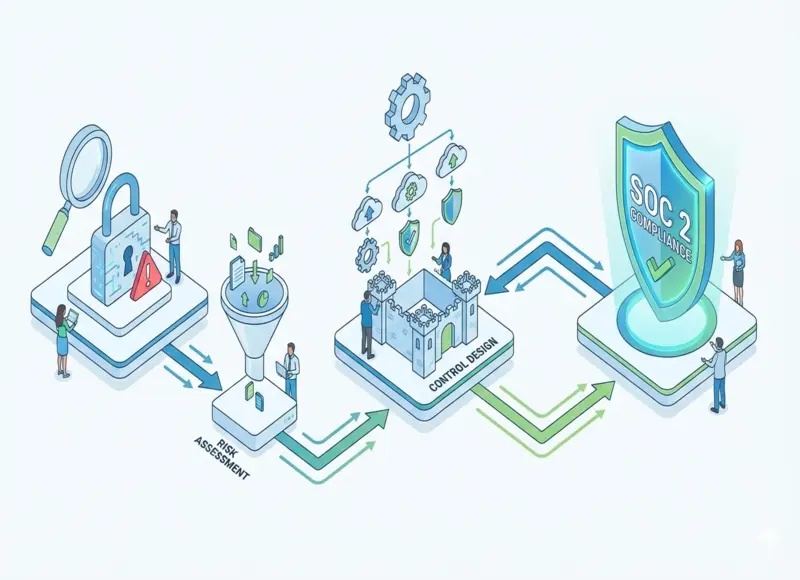Table of Contents
Learn how to select the right healthcare IT support partner by evaluating industry expertise, compliance knowledge, response time, scalability, and commitment to data security and patient privacy.

The demand for the supportive & reliable IT infrastructure and support service has been surging as the healthcare industry has been rapidly turning digital. From Electronic Medical Records (EMR) to AI medical billing, every digital system used in clinical workflows depends on efficient IT support to function seamlessly. Whether your practice operates efficiently or is beset by delays, mistakes, and compliance problems depends on your choice of healthcare IT support partner.
Everything you need to know about choosing a healthcare IT support partner that supports innovation, fits your objectives, and protects patient safety is covered in this guide.
Why Healthcare IT Support Matters
In today’s medical environment, providers rely heavily on technology to manage everything from scheduling to billing and clinical documentation. A dedicated IT partner ensures:
- 24/7 system uptime for patient management tools
- Compliance with HIPAA and other data security standards
- Prompt assistance with EMR, medical device, and telehealth tool issues
- Scalability for growth and new digital initiatives
Working with the right IT provider can have crucial significance and increase productivity and patient outcomes, regardless of whether you are a single pediatrician or a multi-location laboratory facility.
Key Services Offered by Healthcare IT Support Providers
Before choosing a partner, it’s essential to understand the services typically provided by healthcare IT support firms:
1. System Monitoring and Maintenance
Continuous monitoring helps identify potential issues before they disrupt care delivery. This includes EMR uptime monitoring, software updates, and network stability.
2. Data Security and HIPAA Compliance
Cybersecurity is paramount in healthcare. Your IT partner should offer services like firewall configuration, data encryption, and regular compliance audits.
3. AI-Powered Solutions
Modern IT providers often support advanced tools like AI medical billing systems that optimize coding accuracy and streamline claims submission. These tools are essential for reducing denials and accelerating reimbursements.
4. Remote and Onsite Support
Your practice will never feel abandoned during emergencies if you provide a balanced combination of onsite support and remote troubleshooting.
5. Integration with Clinical Software
For a smooth clinical workflow, integration support is essential for everything from lab information software to pediatric EHR systems.
Signs of a Reliable Healthcare IT Support Partner
1. Industry Experience
Choose a provider with a strong background in healthcare. General IT firms may not understand the regulatory landscape or the sensitivity of patient data.
2. Proactive Security Measures
Ask about how they defend against ransomware, phishing, and data breaches. A proactive approach is always better than reactive mitigation.
3. References from Other Healthcare Providers
Look for reviews and case studies, especially from practices in your specialty. If you're a pediatric clinic, a partner experienced with pediatric EMR systems can deliver far better support than one without.
4. Vendor Neutrality
A good partner helps you choose the right tools, not just the ones they resell. Whether you want to outsource laboratory medical billing or integrate a new AI billing solution, they should guide you toward what’s best, not just what they sell.
5. Scalability and Future-Proofing
As your practice grows, so should your IT ecosystem. Whether you're expanding to new locations or introducing telehealth, your IT partner should be ready to scale with you.
How AI Is Shaping Healthcare IT Support
The rapid transformation of Artificial Intelligence, where they practice handling routine and complex tasks alike. For instance, AI medical billing automates the claim generation and identifies potential coding errors before submission, which reduces the rejections.
In the same way, if you want to know when certain IT infrastructure might fail and can inform technicians before time, AI-backed systems can also assist in predicting. This kind of prediction support can save time, money, and improve operational efficiency.
Questions to Ask a Potential IT Support Partner
When interviewing potential partners, don’t just ask about services—dig deeper with questions like:
- How do you handle urgent issues after hours?
- What’s your response time for critical vs. non-critical tickets?
- Can you support specialized systems like pediatric EMR or laboratory software?
- What’s your experience working with providers who outsource laboratory medical billing?
- How do you help practices adopt emerging tools like AI medical billing or telehealth platforms?
Their answers will help you assess not just their competence, but also their commitment to supporting your unique needs.
Red Flags to Avoid
Not all IT support providers are created equal. Avoid partners who:
- Don’t offer a Service Level Agreement (SLA)
- Lack of experience in the healthcare sector
- Use outdated systems or don’t support cloud-based infrastructure.
- Are unwilling to share references
- Don't have cybersecurity certifications.
In healthcare, even minor IT issues can have serious implications, including breaches of patient data or delays in diagnosis. Your IT partner must understand this urgency.
Why Outsourcing Billing and EMR Support Is Smart
Healthcare providers are more likely to outsource laboratory medical billing and EMR management because these tasks are complicated and take a lot of time. Having a reliable IT partner that can connect your EMR system to your billing services can help lighten the load on your staff and let them focus on taking care of patients.
Various dedicated pediatric EMR systems in pediatric practices require frequent updates and support. This likely ensures that they would stay efficient with growth charts, vaccination schedules, and child-specific diagnostic tools. A general EMR isn’t enough, and a general IT provider might not know how to make it work efficiently.
You can improve efficiency, data accuracy, and the speed of reimbursement by hiring professionals who are familiar with these tools to handle both your IT support and billing tasks.
Conclusion
The right healthcare IT support partner is more than just a service provider. They are a strategic partner who helps you improve care delivery, lower risk, and keep up with the fast pace of health tech innovation.
Your IT partner should help you with AI medical billing, managing complicated EMR systems like pediatric EMR, or finding a way to outsource laboratory medical billing. They should do this with expert hands and plans that look ahead.
Take your time to look over your choices. Look for someone who has experience, is flexible, knows a lot about security, and knows a lot about how the healthcare industry works. Your practice can do well in the digital age if you have the right IT partner.
Recent Blogs
Scaling Smarter: How Property Management Software Simplifies Rental Management
-
10 Feb 2026
-
6 Min
-
34
The State of Local MSP Ecosystems: Comparing MSP Density Across Major U.S. Cities
-
06 Feb 2026
-
7 Min
-
260









